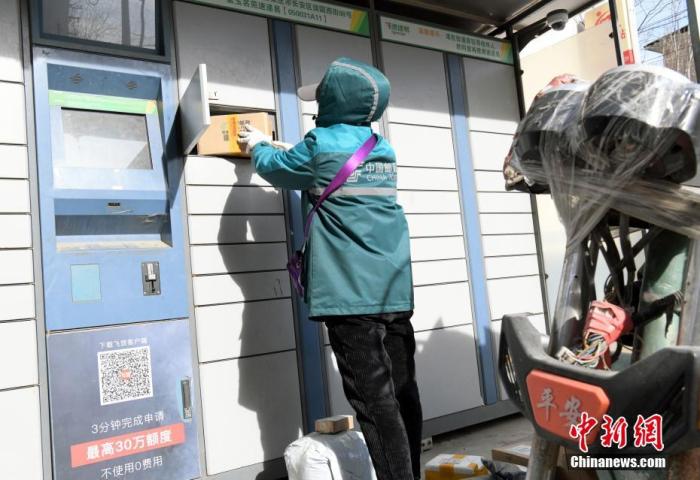(Economic Observation) Protecting the rights and interests of flexible employees, China has eliminated worries for more than 200 million people
China News Service, Beijing, August 17 (Reporter Wang Enbo) Express courier, online anchor, online car-hailing driver... Flexible employment is becoming an important channel for Chinese people to find employment and increase income.
At the recent executive meeting of the State Council, measures such as strengthening the protection of the rights and interests of flexible employees and promoting the healthy development of new industries, new formats and new business models were put on the agenda.
Data map: The postal courier puts the express items into the receiving container.
Photo by China News Agency reporter Chen Hao
The latest data shows that from January to July, China’s urban new jobs reached 8.22 million, achieving 74.7% of the annual target.
Fu Linghui, spokesperson for the National Bureau of Statistics of China, mentioned that one of the main reasons for the current stable employment situation is the growth of new drivers and the increase in flexible employment.
With the rapid development of entrepreneurship and innovation, the sharing economy and the platform economy are growing rapidly, new business models and new models continue to emerge, and the employment-driven effect is increasing.
Official data show that there are more than 200 million people in flexible employment in China.
Liu Shangxi, President of the Chinese Academy of Fiscal Sciences, pointed out that with the development of digital platforms, digital industries, and digital economy, the scale of new flexible employment will continue to grow.
"The new flexible employment will not be a temporary phenomenon, but a long-term employment trend formed during the transition from an industrial economy to a digital economy."
The executive meeting of the State Council pointed out that during the "14th Five-Year Plan" period, China’s urban employment pressure is still relatively high. We must continue to prioritize employment in economic and social development and macroeconomic policies, strengthen government responsibilities, adhere to market leadership, and promote greater and higher levels of achievement. Quality employment.
Around the above goals, the meeting proposed a series of measures, many of which will help to further promote flexible employment.
For example, the meeting put forward "strive to eliminate employment discrimination and strengthen the protection of the rights and interests of flexible employees, older persons, and women workers" has been a hot topic for some time.
The Central Committee of the Democratic National Construction Association pointed out in a proposal published on the eve of the National People’s Congress this year that workers in China’s new forms of employment still have some problems in terms of laws and social security, including: unclear labor relations for laborers; labor rights for laborers Lack of security; weak labor supervision related to new employment forms; labor dispute mediation needs to be strengthened.
It has become the consensus of all parties to strengthen the protection of rights and interests from these aspects and allow flexible employment groups to play lightly.
The meeting also requested that the market needs to strengthen vocational skills training to improve the skills of workers and the quality of safe production.
This is also an important measure to empower flexible employment groups.
Liu Shangxi pointed out that the government should provide vocational skills training to the low-skilled personnel in the flexible employment group in real time to improve the comprehensive quality of the flexible employment group so that they can possess the skills.
This is an important prerequisite for the stable income of flexible employees.
"The general improvement of the quality of workers is also the basis for innovation-driven development."
Following the review and approval of the "14th Five-Year Plan" employment promotion plan at this meeting, improving the multi-channel and flexible employment security system is expected to become one of China's key tasks for stabilizing employment.
In fact, related measures are being continuously introduced recently.
At the end of June, the "Fourteenth Five-Year Plan for Human Resources and Social Security Development" officially announced by China specifically mentioned the promotion of multi-channel flexible employment.
The executive meeting of the State Council held on July 7 determined a number of policies and measures to strengthen the protection of the rights and interests of workers in new forms of employment in terms of labor relations, labor remuneration, occupational injury protection, vocational skills training, and old-age medical protection.
Subsequently, the Ministry of Human Resources and Social Security, the National Development and Reform Commission and other eight departments jointly issued the "Guiding Opinions on Maintaining the Labor Security Rights and Interests of Workers in New Employment Forms", which clarified for the first time multiple focal issues such as platform responsibilities, remuneration, rest, and occupational injury protection. Take-out riders, online ride-hailing drivers, e-commerce anchors, etc. build a “protective net” of rights.
It is understood that various policies and measures to regulate and support the development of new forms of employment will continue to be introduced for some time to come.
For example, relevant parties will study and formulate measures for flexible employees to participate in basic pension insurance for urban and rural residents, and promote the opening of household registration restrictions for flexible employees to participate in social insurance in places of employment.
At the same time, the government will also organize a pilot program of occupational injury protection for flexible employees on the platform, rationally define platform corporate responsibilities, and explore mechanisms for employers to purchase commercial insurance, insurance companies to appropriate profits, and government support to increase mechanisms.
(Finish)

